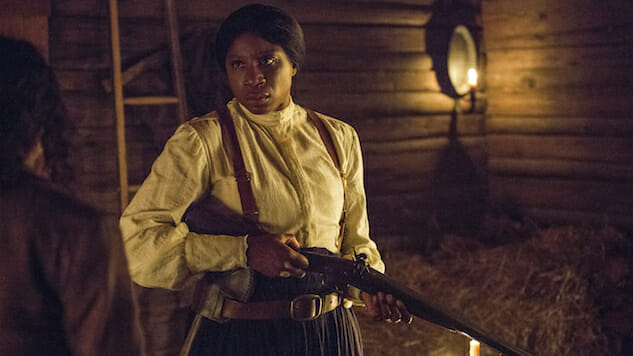Guns, Drugs and Sewing Kits: Female Strength and Solidarity in the Underground Season Premiere
(Episode 2.01)
WGN America
The best writers know that creating strong female characters for TV means granting these characters high highs and low lows, and allowing them to have experiences that reflect their strengths and weaknesses, making them fully human. So whether they are rifle-wielding, formerly enslaved runaways or lost and dejected, opiate-sniffing victims of domestic violence, their characters and their stories still feel powerful. But there’s another aspect of womanhood that often goes ignored in the TV landscape: solidarity. And so, there’s no time like the present political landscape for Underground to return, and remind us that womanism is one powerful form of resistance.
The Season Two premiere is not unlike the Season One finale, in that it becomes clear that, while this is of course a show about enslaved Americans, this is also a show about women and the distinctive power they wield, especially when they maintain their differences and still come together to fight a common enemy. How loud did you scream when Rosalee (Jurnee Smollett-Bell) and Harriet (Aisha Hinds) both pulled their guns on those slave catchers? From the moment we saw Harriet reach out her arm and pull Rosalee out of that wagon in last year’s finale, I knew this dynamic was going to be thrilling to watch. And if “thrilling” was all it was, I’d be pleased.
“My arms are mighty tired, and I aim to end this quick.” — Harriet, rifle in one hand, axe in the other.
In other words, the entirety of this season could consist of us just watching Harriet Tubman and Rosalee killing, threatening and/or bargaining with slave catchers, and I’d likely crown this the greatest show on television. But Underground is better than this, and better than my baser desires. One of the most telling moments of “Contraband” is the conversation between Rosalee and Harriet, when Harriet admonishes her for a dangerous plan to rescue Noah. In this scene, we see a general and her soldier. Rosalee is strong, but comes off as more of a romantic, where Harriet is all about strategy. Again and again, Underground sends the message that, under different circumstances—like freedom—these so-called “slaves” would have been leaders and innovators. We’ve all been taught to think of Harriet Tubman as brave, but I’d argue that even calling her the “Moses” of her people doesn’t give enough credit to the brilliance of her work. Leading hundreds upon hundreds of people out of slavery and into freedom, over and over again, took more than courage, and more than the blessing of a God—it took a woman’s intellect, and a woman’s strength. (And I expect this season of the show to engage with this idea, to make Tubman as human and as fascinating as she surely was in real life.) Rosalee has a lot to learn from her, but I suspect that Harriet has a thing or two to learn from our Rosalee, too.
“I did think there would be… some sewing.” — Elizabeth
As if we needed more proof that there are countless ways to resist a regime, Underground gives us the sewing circle. It’s so good to see Elizabeth (Jessica DeGouw) step out on her own and become part of a group of women working to abolish slavery. And, considering the final shot of the episode, she’s going to need them. John (Marc Blucas) and Elizabeth worked side by side throughout the first season, but I was always interested in Elizabeth’s character because she seemed even more willing to break the rules, going so far as to risk her marriage to protect Boo. Now we’re going to find out what she’s made of without her husband there at all, and who she is alongside a group of women (led by Jasika Nicole’s Georgia) who made me seriously consider running out and getting a gun license. One of the best scenes of the episode features “the sewing circle” in the woods, practicing their aim. As Elizabeth learns to shoot from the hips, we’re privy to a conversation that feels completely relevant today. How does one best take down a massive, systemic injustice? Can journalists solve the problem? Literature? “Catalogues” of violence? What happens when “most people don’t read”? (And when, in our case, those that do happily subscribe to fake news)? The sewing circle, using metal spoons for target practice, doesn’t come up with a single answer, but before the episode is over, they’ll put their very bodies on the line in an attempt to help Noah (Aldis Hodge) escape a hanging. I’m excited to see how they support Elizabeth, and rise up with the rest of the cast throughout the season.
-

-

-

-

-

-

-

-

-

-

-

-

-

-

-

-

-

-

-

-

-

-

-

-

-

-

-

-

-

-

-

-

-

-

-

-

-

-

-

-








































